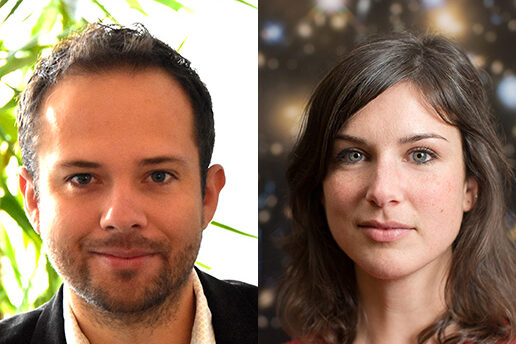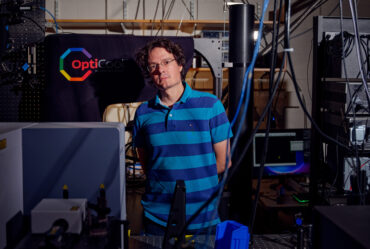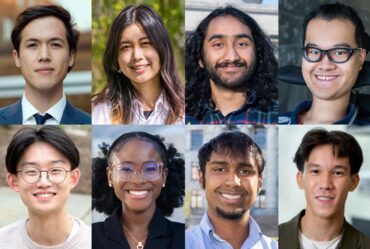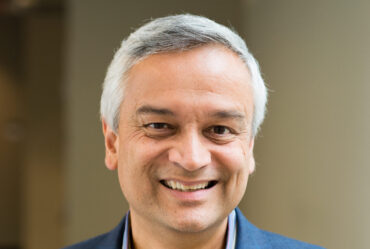
Garcia Ruiz and Kara named 2023 Sloan Research Fellows
Annual award honors early-career researchers for creativity, innovation, and research accomplishments.
Nine members of the MIT faculty, along with two former Pappalardo Fellows Benjamin Safdi and Sanfeng Wu, are among 126 early-career researchers honored across seven fields with 2023 Sloan Research Fellowships by the Alfred P. Sloan Foundation. Representing the departments of Aeronautics and Astronautics, Chemistry, Economics, Electrical Engineering and Computer Science, Materials Science and Engineering, Mathematics, and Physics, the honorees will each receive a two-year, $75,000 fellowship to advance their research.
Including this year’s recipients, a total of 318 MIT faculty have received Sloan Research Fellowships since the first fellowships were awarded in 1955.
Luca Carlone is the Leonardo Career Development Associate Professor in the Department of Aeronautics and Astronautics and a principal investigator in the MIT Laboratory for Information and Decision Systems (LIDS). He is the director of the MIT SPARK Lab, which works at the cutting edge of robotics and autonomous systems research. Carlone researches human-level perception and world understanding on mobile robotics platforms (drones, self-driving vehicles, ground robots) operating in the real world. His research includes nonlinear estimation and probabilistic inference, numerical and distributed optimization, and geometric computer vision applied to sensing, perception, and decision-making in single and multi-robot systems. Carlone was recently selected to the editorial board of the International Journal of Robotics as a senior editor and named an associate fellow class of 2023 in the American Institute of Aeronautics and Astronautics.
Rafael Gómez-Bombarelli is the Jeffrey Cheah Career Development Chair in Engineering in the Department of Materials Science and Engineering and an investigator in the MIT-IBM Watson AI Lab. His research pairs computational design with machine learning to accelerate the discovery of new materials. Using theoretical and experimental data, Gómez-Bombarelli and his research lab colleagues relate the composition and structure of molecules and solids to their performance and identify candidates for practical applications. They have used the approach to design new forms of zeolites, for example — a class of porous minerals used in industrial applications — for specific, climate-change-focused applications, such as cleaning up exhaust from vehicles. Other applications include therapeutic peptides, electrolytes for batteries, inorganic oxides for sustainable catalysis, carbon-capture materials, and sustainable polymers.
Jeremy Hahn ’13 is the Rockwell International Career Development Assistant Professor of Mathematics. His research is in algebraic topology and homotopy theory. With collaborators, he has done work in equivariant chromatic homotopy theory, the classification of high-dimensional manifolds, and the redshift conjectures in algebraic K-theory. He hopes to better understand the behavior of new invariants of ring spectra, such as syntomic and prismatic cohomology.
Song Han, an electrical engineeering and computer science (EECS) associate professor, proposed the “Deep Compression” technique that’s widely used for efficient artificial intelligence computing, and “Efficient Inference Engine” that first brought weight sparsity to modern AI chips, which influenced NVIDIA’s Ampere GPU. He introduced the TinyML research that brings deep learning to internet-of-things devices, enabling learning on the edge. His work on hardware-aware neural architecture search (once-for-all network) enables users to design, optimize, shrink, and deploy AI models to resource-constrained hardware devices. Han received best paper awards at ICLR and FPGA, faculty awards from Amazon, SONY, Facebook, NVIDIA, and Samsung, NSF CAREER Award, “35 Innovators Under 35” by MIT Technology Review, and “AIs 10 to Watch: The Future of AI” award by IEEE.
Erin Kara is the Class of 1958 Career Development Assistant Professor of Physics and a member of the MIT Kavli Institute for Astrophysics and Space Research. An observational astrophysicist who is working to understand the physics behind how black holes grow and affect their environments, she also works to develop new and future space missions. Kara is a NASA participating scientist of the XRISM Observatory, to launch later this year, and is the deputy principal investigator of the AXIS Probe Mission Concept.
Jonathan Ragan-Kelley SM ’07, PhD’14 is the Esther and Harold E. Edgerton Assistant Professor in EECS. He is affiliated with the Computer Science and Artificial Intelligence Laboratory (CSAIL), where his research focuses on computer graphics, compilers, domain-specific languages, and high-performance systems. While completing his PhD at MIT in 2014 under the supervision of professors Frédo Durand and Saman Amarasingh, Ragan-Kelley was instrumental in developing the language and compiler Halide, “a language for fast, portable computation on images and tensors” that has become the “industry standard for computational photography and image processing.” Fast and efficient, Halide was created to make writing high-performance image processing code on modern machines more seamless. His earlier work on the language Lightspeed has been an instrumental tool in producing films, and for those efforts he was a finalist for a technical Academy Award.
Ronald Fernando Garcia Ruiz, an assistant professor in physics and a researcher with the Laboratory for Nuclear Science’s Hadronic Physics Group, focuses on the development of laser spectroscopy techniques to investigate the properties of subatomic particles using atoms and molecules made up of short-lived radioactive nuclei. His experimental work provides unique information about the fundamental forces of nature, the properties of nuclear matter at the limits of existence, and the search for new physics beyond the Standard Model of particle physics.
Tobias Saltz, the Castle Krob Career Development Assistant Professor of Economics, works in the field of empirical industrial organization. His main research interests are decentralized markets, platforms, and intermediaries. A recent area of focus of his research agenda are transportation markets. In a separate line of research, he studies the economic and regulatory implications of the emerging abundance of consumer data and advances in artificial intelligence that are enabled by these data.
Alison Wendlandt, the Green Career Development Assistant Professor of Chemistry, focuses on the development of selective, catalytic reactions using the tools of organic and organometallic synthesis and physical organic chemistry. Mechanistic study plays a central role in the development of these new transformations. Her projects involve the design of new catalysts and catalytic transformations, the identification of important applications for selective catalytic processes, and the elucidation of new mechanistic principles to expand powerful existing catalytic reaction manifolds.
“Sloan Research Fellows are shining examples of innovative and impactful research,” says Adam F. Falk, president of the Alfred P. Sloan Foundation. “We are thrilled to support their groundbreaking work and we look forward to following their continued success.”
Many young researchers awarded the prestigious Sloan Research Fellowship have gone on to become prominent figures in science: 56 fellows have received a Nobel Prize in their respective field, 17 have won the Fields Medal in mathematics, and 22 have won the John Bates Clark Medal in economics, including every winner since 2007.


